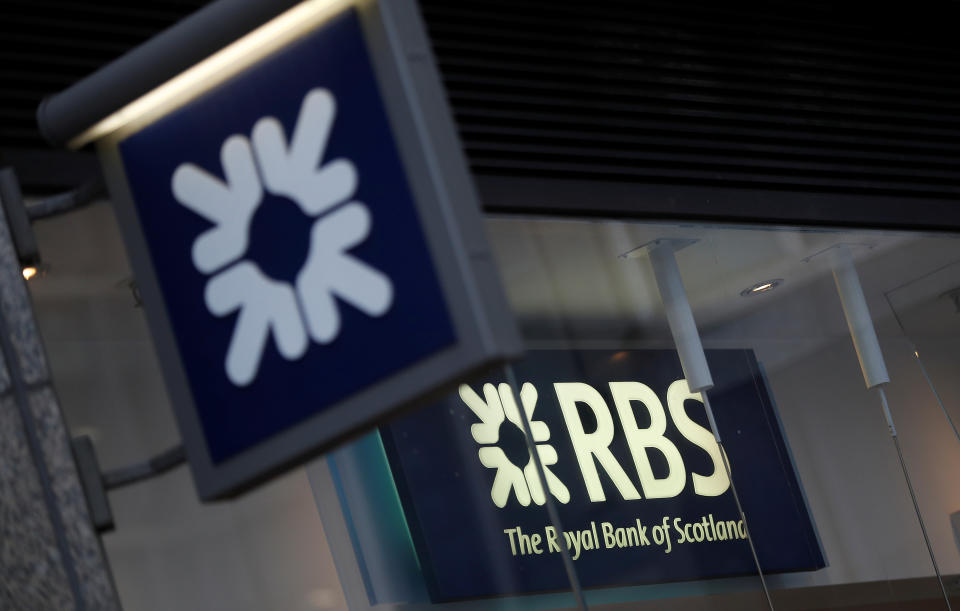PPI claims surge and market ructions push RBS to a loss

Royal Bank of Scotland (RBS.L) fell to a loss in the third quarter of the year, the bank said on Thursday, due to a surge in late PPI claims and a “deterioration” of conditions in global markets.
RBS made an operating loss of £8m in the third quarter and a loss attributable to shareholders of £315m. It compares to an attributable profit of £1.3bn in the second quarter.
The third quarter loss was unexpected. Analysts had been forecasting a profit attributable to shareholders of £374m.
Total income fell to £2.9bn, down from £4bn in the second quarter. Analysts had been forecasting income of £3.5bn.
RBS shares fell 3% in early trade in London.
PPI pain
RBS blamed its poor performance on a late surge in claims for payment protection insurance (PPI) compensation around the August deadline, which forced it to set aside an extra £900m in September to cover claims.
READ MORE: PPI claims deadline costs RBS £900m
The bank was also impacted by a “particularly challenging” quarter for NatWest Markets, its investment banking and trading division. Core income at the division was £184m, 44% lower than in the third quarter of 2018. Jefferies called the division’s performance “deplorable”.
“Rates income in particular was impacted by a deterioration in economic sentiment for the global economy and a fall in bond yields,” RBS said. “This, together with legacy items culminated in a loss of £193m for the quarter.”
Bond yields move inversely to price, meaning they fall when demand is high. Fears about slowing global growth and the US-China trade war sparked huge demand for seemingly safer investments such as bonds and, by August, the price surge meant around a third of global bonds were negative yielding, meaning a loss was guaranteed. Prices have since eased.
Despite the two big drags, chief financial officer Katie Murray said the bank had a “solid underlying performance in a tough operating environment.”
“The core retail and commercial bank continues to perform well, and we are making good progress against our targets for the year,” she said in a statement.
New mortgages rose to £8.6bn in the quarter, up from £6.7bn in the second quarter of the year. Commercial loans also rose by £100m.
However, RBS’ profit margins in lending were squeezed by the “contraction of the yield curve,” which pushed up the cost of capital. The bank’s net interest margin — the difference between its cost of capital and the average rate it lends at — fell by 5 basis to 1.97%.
READ MORE: First woman to lead top UK bank as RBS names Alison Rose CEO
“We have seen strong growth across the business and our sustained high levels of capital and liquidity mean we are well positioned to support our customers in these uncertain times,” Murray said.
The bank cut costs by £20m in the quarter. Murray wouldn’t comment on whether RBS would follow rival banks in cutting jobs as it seeks to axe £300m in costs by the end of the year.
‘Weak across the board’
Analyst Chris Manners and his team at Barclays called the results “weak across the board.”
Return on tangible equity, a key measure of banking performance, was 7% in the quarter when the PPI charges are stripped out but negative 3.8% when it is included.
RBS is targeting a return on tangible equity of 12% by 2020. Neil Wilson, chief market analyst at Markets.com, said: “Last quarter management said hitting that target by 2020 was ‘very unlikely’. We may say now ‘totally impossible’.”
RBS said Thursday it remains on track to meet its full-year targets, without giving details.
“With no change to outlook statement investors will likely need to wait until new CEO offers more on strategy to understand the path to double digit return on equity,” Manners and team wrote.
The weaker-than-expected third quarter performance underlines the challenges facing RBS’ new CEO Alison Rose, who starts in the top job next week. As well as deteriorating global markets and fears of a possible recession, Rose must navigate the continued Brexit uncertainty.
Addressing Brexit, Murray told analysts on Thursday morning the bank was “focused on controlling the controllable” and said: “As far as RBS is concerned, out preparations are in place.”
She added that RBS “continue to work closely with our customers.” NatWest, which is owned by RBS, last week added £2.2bn to its small business Brexit preparation fund, taking the total committed to £8.2bn.

 Yahoo Finance
Yahoo Finance 